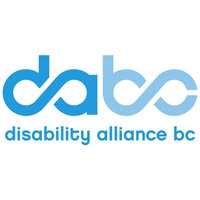DABC's Review of the Canada Disability Benefit proposed regulation
September 23, 2024 by DABC
When first announced in September 2020’s throne speech, the Canada Disability Benefit (CDB) held the promise of lifting people with disabilities out of poverty.
The CDB as proposed underdelivers on this promise; people with disabilities will only be able to receive a maximum of $2,400 a year. For most, this is not enough to cover higher costs of living or exorbitant medical costs associated with living with a disability.
Regulations published in June 2024 reveal restrictive policies around eligibility criteria, income thresholds, and earning caps that may further entrench people with disabilities in cycles of poverty. DABC has published an in depth review of the proposed regulations, with 20 recommendations for change. This review has been submitted to the federal government during the consultation period.
You can read our review here:
https://disabilityalliancebc.org/wp-content/uploads/2024/09/Canada-Disability-Benefit-In-Depth-Review-by-DABC.docx.
Disabilities, Dating, and the PWD Spousal Cap
Last week, Disability Alliance BC shared on our social media platforms an engagement request from CBC Vancouver, for people with disabilities to talk about their experiences with dating. The post received strong feedback from our followers on Facebook, who rightly pointed out the unfairness of the PWD benefit spousal cap, and the fact that many disabled people are facing far more pressing issues than dating—issues like insufficient disability benefit rates/poverty and unaffordable/scarce housing—that often prevent people with disabilities from entering the dating world.
We are very appreciative of the strong engagement and opinions that people shared on the post. Everyone’s comments were heard. DABC sent a summary of this feedback to CBC, which led to CBC learning from this experience and making it the focus of their dating segment, which can be streamed here: https://www.cbc.ca/listen/live-radio/1-46-on-the-coast/clip/16082623-up-date-disabilities-dating.
Additionally, CBC reached out to Minister of Social Development and Poverty Reduction Sheila Malcolmson, and questioned her on air about the spousal cap. Stream that interview here: https://www.cbc.ca/listen/live-radio/1-46-on-the-coast/clip/16082708-disability-benefits-british-columbians.
Last week, CBC also interviewed DABC Executive Director Helaine Boyd about the same issue: https://www.cbc.ca/player/play/video/9.6458198.
DABC feels very strongly that the spousal cap is unjust. There are many negative impacts to restricting a person’s disability income because of a partner/spouse’s income:
- Creates unequal power dynamic between partners.
- In scenarios where a person on PWD is in a live-in relationship with a non-disabled person, it expects that the non-disabled partner is responsible for the disabled partner’s livelihood and well-being. This circles back to outdated, patriarchal laws of many decades prior.
- Particularly for people who identify as women/femmes, this can create a level of dependence on the non-disabled partner that may lead to spousal abuse.
- Creates a level of financial dependence on the disabled partner whereby they may feel they have no choice to end a relationship.
- In the context of dating/seeking relationships, being on PWD prevents people from entering into relationships on an equal footing, or even deters prospective partners because of the expectation that they become financially responsible.
Due to the reasons above, the PWD system is actively encouraging and influencing people on PWD to remain single or otherwise make it very difficult to obtain and sustain a relationship. The spousal cap is in direct opposition with a person’s right to independence and equal opportunity, and therefore discriminates against people with disabilities.
DABC has advocated for an end to the spousal cap over the years. We’ve repeatedly brought the spousal cap up in conversations and committee meetings with the Ministry of Social Development and Poverty Reduction. DABC’s advocates, many of whom are people with disabilities themselves, feel very strongly about this issue. Most recently:
From the CBC radio interview, it is now clear that Minister Malcolmson knows very well the harms incurred by the spousal cap on PWD recipients. The BC government has often prided itself as a progressive province compared to the rest of Canada, but the fact remains that BC has the second highest poverty rate. People with disabilities in BC need a government that is bold, willing to challenge social norms and enact change.
The BC Government will be launching their new BC Poverty Reduction Strategy tomorrow; we hope that the strategy will include this and other recommendations for change that DABC has advocated on to reduce poverty in our province.
DABC and others ask Ministry to remove earnings restrictions
Did you know disabled workers can only earn $16,200 a year before they lose access to their disability benefits? And when they lose access to their disability benefits it sometimes can mean they lose access to other entitlements such as housing.
Living Wage Employers who want to do the right thing face a difficult dilemma – do they pay their disabled staff less by offering them fewer hours than their non-disabled peers or do they let their staff lose access to the support they’re entitled to?
We’ve partnered with Living Wage for Families BC and BC Poverty Reduction Coalition on an open letter to Minister of Social Development and Poverty Reduction Sheila Malcolmson, to ask her to use the upcoming review of the Poverty Reduction Strategy to remove these restrictions and allow disabled workers to earn a Living Wage. 50 other employers have also signed the letter.
Read the letter and share: https://www.livingwageforfamilies.ca/openletter
Press release: https://tinyurl.com/3kykdkpz




